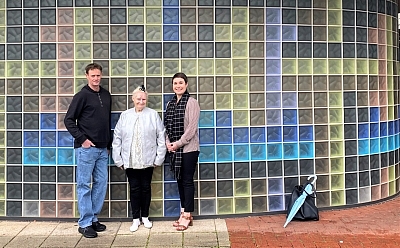Up to 150 people who have been homeless, or are at risk of becoming so, will be supported through an outreach program that is the result of a partnership between global resources company BHP and not-for-profit organisation St Bart’s.
St Bart’s has been supporting people experiencing homelessness and mental health issues in Perth for almost 60 years.
Eighteen months on from the launch of St Bart’s partnership with BHP in the Reconnecting Lives pilot Program, BHP has announced it will inject an additional $2 million into this important program for another two and a half years.
The Program is designed to support people as they first secure stable accommodation, who are at risk of, or experiencing, homelessness and/or mental health issues, with wraparound services and individualised support to help them maintain that long-term stable accommodation, engage in their communities, rebuild their lives, and ultimately break the cycle of homelessness.
“This partnership is critical in helping us provide more data to establish a good body of evidence on the best model of implementation of the Housing First or Housing Led approach, which is a key priority of the State Government’s 10-year homelessness strategy, All Paths Lead to a Home, and the community services sector,” said St Bart’s CEO Samantha Drury.
Reconnecting Lives Program was established in 2018 to support people in St Bart’s transitional accommodation to find, and maintain, sustainable housing.
Outcomes from the first phase have led to changes to the program, including an increase in the number of case managers and support workers to be able to provide higher levels of support to more people. It has also been extended to include people who rent St Bart’s community housing and have been identified as being at risk of falling back into homelessness.
With up to 10,000 people sleeping rough in Perth on any given night, BHP’s investment means there will be less people at risk of moving back into homelessness at a time when that number is already expected to increase due to the economic downturn.
As of 30 June 2020, which marked the end of phase one of the Program, 135 consumers had participated in the Program and 90 were actively receiving the service. Of that total number, 108 consumers had maintained long-term accommodation and of the remaining 27 consumers, 14 were in short-term accommodation and continuing the search, while 13 had exited the Program.
The success of the Program lies in wrap-around services provided by case managers to consumers that is tailored based on the need of each person, including referrals to relevant services, attending appointments, training, social support, NDIS implementation, goal planning, tenancy and budgeting support, and obtaining ID.
“Aside from BHP’s financial support of this program, the corporate social responsibility shown by BHP is equally as valuable,” said Ms Drury. “In the last two years, BHP staff have volunteered a total of 1,071 hours to support tasks ranging from assembling Christmas hampers for our clients to gardening, painting, cooking and, importantly, engaging our consumers with planned activities.”
Media contact:
Rebekah Spencer – Communications Advisor
rebekah.spencer@stbarts.org.au, 9323 5140
Wendy Pryer – General Manager Communications and Engagement
wendy.pryer@stbarts.org.au, 0409 796 999
FAST FACTS
• Over 10,000 people experience homelessness every day across WA
• Over 4300 people access specialist homelessness services every day
• Over 14,000 are on the wait list for social housing
ABOUT US
Since 1963, St Bart’s has been standing by the side of Western Australians at risk of, or experiencing homelessness, mental health challenges, trauma and hardship.
We provide support to more than 530 consumers through a range of services that are based on trauma informed recovery. This means that we recognise and respond to the effects of all types of trauma, and the person drives the type of support they receive. Our goal is to support people to make their own choices and choose today the future they want for tomorrow.
Background information:
Housing Led refers to people being supported to move from transitional accommodation into their own homes in the community.
Housing First refers to people being moved directly from the street into their own accommodation in the community.



